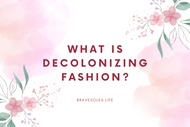What is Decolonizing Fashion and How can we do it?
Posted by Negeen Naikayen on 2024 Feb 1st
Have you ever wondered where your clothes come from? Not just the store or brand, but the actual origins of the materials and styles? As a consumer, it's easy to fall into the trap of fast fashion without realizing its implications for the environment and other cultures. But what if we, as a society, shifted our focus to decolonizing fashion? What does that even mean? Well, let me tell you.
Decolonizing fashion means acknowledging and respecting the origins of different designs, textiles, and patterns. This means recognizing the rich histories and cultures that have contributed to the fashion industry. The fashion landscape has also been marred by instances of cultural appropriation, where elements of one culture are taken without proper understanding or respect. This not only perpetuates stereotypes but also marginalizes the communities from which these elements are borrowed. For example, the traditional African textile of Kente has been replicated by big fashion brands without proper credit or compensation to the original creators. This lack of recognition perpetuates cultural appropriation and strips cultures of their identities. By decolonizing fashion, we can celebrate and appreciate different cultures and fight against cultural appropriation.
Another aspect of decolonizing fashion is addressing the labor exploitation and environmental impact that often comes with fast fashion. According to The World Bank, the fashion industry produces approximately 10% of annual global carbon emissions and is the second largest consumer of water. At this pace, the fashion industry’s greenhouse gas emissions will surge by more than 50 % by 2030.
Additionally, a majority of workers in the fashion industry are underpaid and work in unsafe conditions. Fashion Revolution Index revealed in July 2023 that the majority (99%) of major fashion brands do not disclose the number of workers in their supply chains being paid a living wage rate. This sheds light on the harsh reality faced by many workers who are often underpaid and working in unsafe conditions. By decolonizing fashion, we can encourage transparency and sustainability in the fashion industry. We can prioritize fair working conditions for laborers and seek out eco-friendly alternatives to harmful production methods.
Furthermore, decolonizing fashion involves questioning who is not being included in fashion. For too long, Western beauty standards have dominated the fashion world, leaving little room for diversity in body types and skin color. By decolonizing fashion, we can embrace and celebrate all types of beauty and their origins. This can empower marginalized communities and promote different cultural expressions without exoticizing them.
Lastly, decolonizing fashion means paying attention to where and how we shop. By supporting local, ethical, and sustainable brands, we can create demand for responsible production methods and support fair wages for workers. Upcycling and thrift shopping can also help reduce waste and slow down the fast fashion cycle. Small changes in our consumer habits can make a big difference in the fashion industry and the world as a whole.
Decolonizing fashion is a complex issue - but we don’t need to overcomplicate it. It involves addressing environmental harm, labor exploitation, Eurocentric beauty standards, and cultural appropriation. As people who want to make a difference, we all have the power to make a difference by supporting ethical and sustainable brands, promoting inclusivity in the industry, and educating ourselves on the origins of different designs and patterns.
If we truly want a more equitable and responsible fashion industry we must start with recognizing what needs to change.

